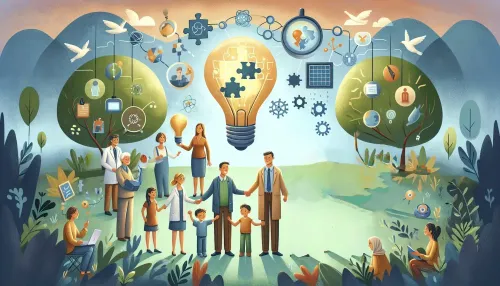Inclusive Advocacy Through the Ages: Ethical Narratives from Different Generations

Autism spectrum disorder (ASD) has been the subject of advocacy and policy reform across generations. From seasoned activists pioneering change to youthful perspectives redefining inclusion strategies, the collective effort to shape a supportive society for autistic children has seen significant evolution. This intergenerational dialogue highlights the influential impact and ethical narratives that continue to drive inclusive advocacy.
Pioneering Change: Seasoned Activists and Policy Reform
The journey of advocating for autistic individuals spans decades, with seasoned activists playing a pivotal role in shaping policy reforms. Their relentless dedication has led to milestone achievements in securing rights and improving the quality of life for autistic children. Here are actionable steps inspired by their impact on policy reform:
- Legislative Advocacy: Engage with policymakers and legislators to prioritize inclusive policies tailored to the needs of autistic children. Advocate for educational and healthcare reforms that promote accessibility and support services.
Key Strategies from Seasoned Activists
Community Empowerment: Establish support networks within communities, leveraging the wisdom and experience of seasoned activists to create inclusive environments for autistic children.
Interdisciplinary Collaboration: Foster partnerships between professionals, educators, and advocates to develop comprehensive programs and resources that address the diverse needs of autistic individuals.
The emergence of youthful perspectives has brought forth innovative approaches to inclusion strategies and community engagement for autistic children. Their fresh outlook and proactive initiatives have redefined the landscape of advocacy. Here are actionable insights inspired by youthful perspectives:
- Peer Support Networks: Cultivate peer support groups led by young advocates to foster understanding and inclusivity within schools and communities.
Related Article: Charting New Paths: Visionary Leadership in Autism Advocacy
Youthful Perspectives: Innovative Inclusion Strategies
- Digital Advocacy Platforms: Harness the power of technology and social media to amplify awareness campaigns, create online support communities, and advocate for policy changes.
Actionable Insights from Young Advocates
- Youth-Led Initiatives: Encourage the development of youth-led initiatives that promote acceptance, empowerment, and celebration of neurodiversity in educational institutions and public spaces.
The influence of social media has revolutionized advocacy efforts for autistic individuals, transcending generational boundaries. It has become a powerful tool for raising awareness, mobilizing support, and amplifying the voices of advocates across diverse age groups. Here are strategies for maximizing social media influence in advocacy:
- Strategic Storytelling: Harness the emotive power of personal narratives and success stories to humanize the advocacy cause, eliciting empathy and understanding from a broader online audience.
The Role of Social Media in Advocacy Efforts
Collaborative Campaigns: Facilitate cross-generational collaborations on social media platforms to create impactful advocacy campaigns that resonate with diverse age groups.
Engagement with Influencers: Collaborate with influencers who have a genuine interest in advocating for autistic individuals, leveraging their reach to amplify awareness and garner support.
Maximizing Social Media Influence for Advocacy
The intergenerational dialogue between seasoned activists and youthful advocates underscores the continuum of progress in shaping a supportive society for autistic children. It fosters a holistic approach that embraces insights from different eras, contributing to a rich tapestry of inclusive advocacy. Here are actionable steps derived from this dialogue:
Knowledge Exchange Forums: Organize intergenerational knowledge exchange forums that allow seasoned activists and youth advocates to share best practices, challenges, and innovative solutions.
Mentorship Programs: Establish mentorship programs that pair seasoned advocates with young activists, creating opportunities for reciprocal learning and collaborative advocacy efforts.
Related Article: Bold Visionaries Shaping Autism Support: Champions of Change in Advocacy and Innovation
An Intergenerational Dialogue on Advocacy
- Intergenerational Events: Host events that celebrate the diversity of advocacy efforts across generations, highlighting the unified goal of creating a supportive society for autistic children.
Steps to Foster Intergenerational Collaboration
In conclusion, inclusive advocacy through the ages encompasses a continuum of change driven by passionate individuals across different generations. By embracing the ethical narratives from seasoned activists, embracing youthful perspectives, leveraging social media influence, and fostering intergenerational dialogue, HorizonsMind ensures its commitment to advocating for autistic children stands strong across diverse age groups while continually evolving toward a more inclusive future.
Frequently Asked Questions
Seasoned activists are crucial in advocating for autistic individuals, as they have shaped policy reforms over decades. Their dedication has led to significant achievements in securing rights and improving the quality of life for autistic children through legislative advocacy, community empowerment, and interdisciplinary collaboration.
Youthful perspectives are redefining inclusion strategies by introducing innovative approaches such as peer support networks and digital advocacy platforms. Young advocates actively engage in community initiatives that promote understanding and acceptance of neurodiversity, making significant contributions to the landscape of advocacy for autistic children.
To enhance social media's influence on advocacy efforts, organizations can utilize strategic storytelling to share personal narratives that resonate with audiences. Collaborative campaigns across generations and partnerships with influencers can amplify awareness and mobilize support, making advocacy more impactful and far-reaching.
Intergenerational dialogue is vital as it fosters collaboration between seasoned activists and youthful advocates, allowing for a rich exchange of insights and best practices. This dialogue contributes to a holistic approach in advocacy, ensuring that diverse perspectives shape a supportive society for autistic children.
Actionable steps inspired by seasoned activists include engaging with policymakers to prioritize inclusive policies, establishing community support networks, and fostering interdisciplinary collaborations. These initiatives aim to create accessible educational and healthcare reforms tailored to the needs of autistic children.
Youth-led initiatives can promote acceptance of neurodiversity by organizing events and programs that celebrate differences within educational institutions and public spaces. These initiatives empower young advocates to lead discussions on inclusivity, fostering a culture of understanding and support among peers.
Knowledge exchange forums are organized events where seasoned activists and youth advocates come together to share experiences, challenges, and innovative solutions. These forums facilitate learning from one another, enhancing collaborative efforts in advocating for the rights and needs of autistic children.
Check Out These Related Articles

Beyond Awareness: Exploring Gen Z's Role in Pioneering Design Thinking for Autism-Supportive Products

Collaborative Engagement in Autism Advocacy: Uniting Stakeholders for Systemic Change and Inclusive Support Models

Young Voices, Big Impact: Amplifying Autistic Youth in Media and Advocacy
